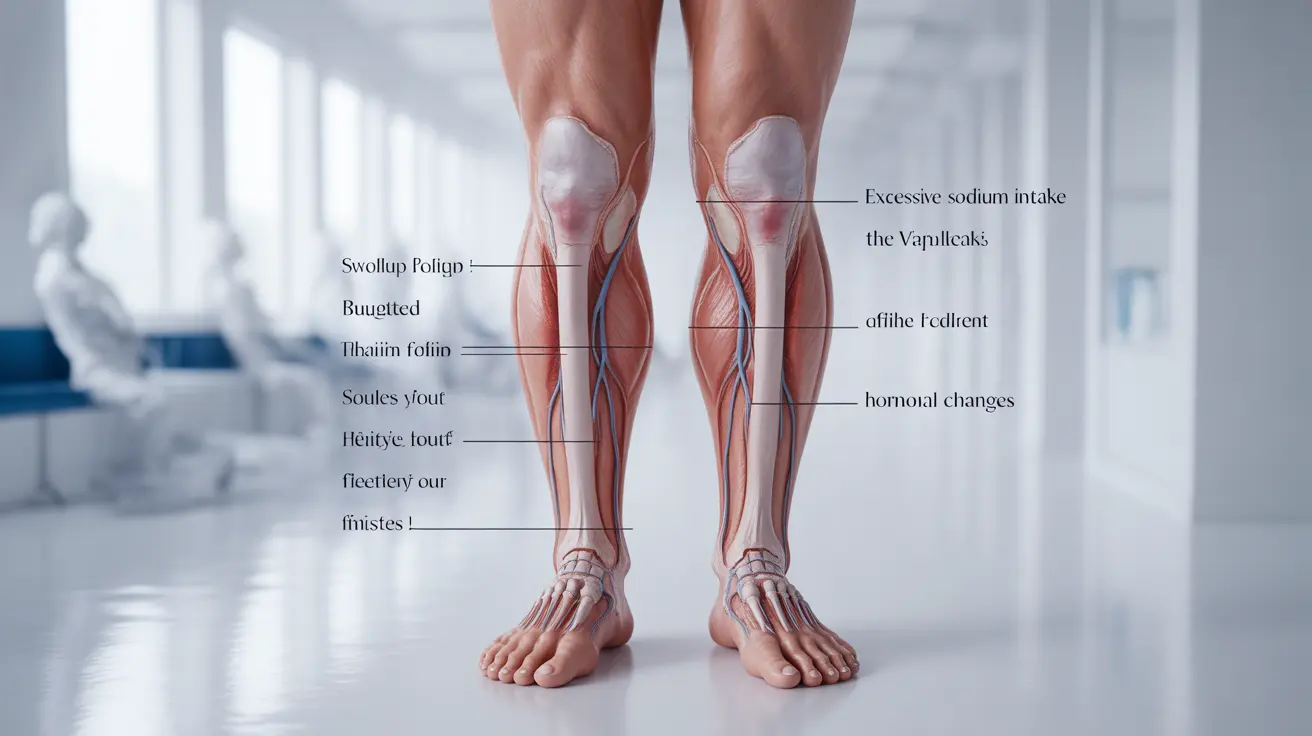Water retention, also known as fluid retention or edema, occurs when excess fluid builds up within your body's tissues. While some degree of fluid fluctuation is normal, persistent or severe water retention can be uncomfortable and may signal underlying health issues. Understanding its causes and knowing how to address it effectively is crucial for maintaining optimal health.
This comprehensive guide explores the various aspects of water retention, from common causes to effective management strategies, helping you make informed decisions about your health.
Common Causes of Water Retention
Water retention can occur due to various factors, ranging from lifestyle choices to medical conditions:
Dietary Factors
Excessive sodium intake is one of the most common causes of water retention. When you consume too much salt, your body holds onto water to maintain proper sodium concentration in your blood. Processed foods, restaurant meals, and preserved foods often contain high levels of sodium that can contribute to fluid retention.
Hormonal Changes
Hormonal fluctuations, particularly in women, can lead to temporary water retention. This commonly occurs during:
- Menstrual cycles
- Pregnancy
- Hormonal medication use
- Menopause
Medical Conditions
Several health conditions can cause water retention:
- Heart failure
- Kidney disease
- Liver problems
- Chronic venous insufficiency
- Lymphatic system issues
Signs and Symptoms of Water Retention
Recognizing the signs of water retention is crucial for proper management:
- Swollen ankles, feet, and legs
- Puffy face and eyes
- Stiff joints
- Sudden weight fluctuations
- Skin that appears stretched or shiny
- Indentations remaining after pressing on the skin
Natural Solutions for Managing Water Retention
Several natural approaches can help reduce water retention:
Lifestyle Modifications
Making certain lifestyle changes can significantly impact fluid retention:
- Regular physical activity
- Maintaining proper posture
- Avoiding prolonged sitting or standing
- Elevating legs when resting
- Wearing compression garments when recommended
Dietary Adjustments
Dietary changes that can help manage water retention include:
- Reducing sodium intake to less than 2,300 mg daily
- Increasing potassium-rich foods consumption
- Staying properly hydrated
- Including natural diuretic foods like parsley, celery, and cucumber
- Limiting processed food intake
When to Seek Medical Attention
While mild water retention often resolves on its own, certain situations warrant medical attention:
- Severe or sudden swelling
- Difficulty breathing
- Chest pain
- Severe leg pain or warmth in a swollen area
- Unexplained weight gain
- Symptoms that don't improve with lifestyle changes
Frequently Asked Questions
What are the common causes of water retention in the body? The most common causes include excessive sodium intake, hormonal changes, certain medications, prolonged sitting or standing, and underlying medical conditions such as heart, kidney, or liver problems.
How do I know if my water retention is caused by a serious medical condition? Signs that water retention may be serious include severe or sudden swelling, difficulty breathing, chest pain, severe leg pain, or swelling accompanied by warmth and redness. If you experience these symptoms, seek immediate medical attention.
What are some effective natural remedies to reduce water retention? Effective natural remedies include reducing sodium intake, staying physically active, maintaining proper hydration, consuming potassium-rich foods, and using compression garments when appropriate. Herbs like dandelion and parsley may also have natural diuretic properties.
Can limiting sodium intake really help with water retention, and how much sodium should I limit in my diet? Yes, limiting sodium intake can significantly help reduce water retention. The recommended daily sodium intake should not exceed 2,300 mg for most adults. Those with certain medical conditions may need to restrict sodium intake even further under medical supervision.
What are the differences between temporary and chronic water retention, and when should I seek medical attention? Temporary water retention often occurs due to dietary factors, menstrual cycles, or prolonged sitting/standing and typically resolves on its own. Chronic water retention may indicate an underlying medical condition and requires medical evaluation, especially if accompanied by severe symptoms or doesn't improve with lifestyle changes.




